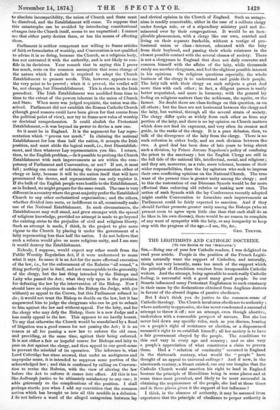THE LEGITIMLSTS AND CATHOLIC DOCTRINE.
[TO THE EDITOR OF THE "SPECTATOR.")
Sin,—Being one of your few Catholic readers, I was delighted to read your article. People in the position of the French Legiti- mists naturally want the support of Catholics, and naturally, though not very honestly, make too much of the support which the principle of Hereditism receives from irresponsible Catholic writers. And the attempt, being agreeable to much really Catholic feeling, is successful with a good many good people. So our Stuarts influenced many Protestant Englishmen to such constancy in their cause by the declarations obtained from Anglican doctors in favour of the absurd dogma of passive obedience.
But I don't think you do justice to the common-sense of Catholic theology. The Church inculcates obedience to authority : where authority is oppressive, she has never condemned a successful attempt to throw it off ; nor an attempt, even though abortive, undertaken with a reasonable prospect of success. But she has never laid down any specific rules, such as you discuss, bearing on a people's right of resistance or election, or a dispossessed monarch's right to re-establish himself ; all her anxiety is to have a fair government obeyed by the people. The conditions to this end vary in every age and country ; and so also vary a people's appreciation of what constitutes a claim to govern them. Had a " solution of continuity" occurred in England in the thirteenth century, what would the " people " have thought of an appeal to universal suffrage ? And if now, in the nineteenth century, a Stuart existed, can any one imagine that the Catholic Church would sanction his right to land in England because the principle of Hereditism being in some places and at some times most prevalent, and likely to be most successful in obtaining the acquiescence of the people, she bad at those times and in those places given it the support of her influence ?
I. think, in the absence of authority, it may be assumed from experience that the principle of obedience to proper authority is
all the 'Church is committed to, whatever theories as to special rights of peoples and rulers may be deduced from the writings of theologians, writing, as they do write on such matters, on general principles, not on the application of them. The Church of Rome was not founded to make Don Carlos and the Comte de Chambord kings of Spain and France. If Don Carlos wins the stake he is playing for, he will, by deeds, not words, prove himself the Bing and constituted authority of Spain; if the French Assembly call Henri. V. to the throne, and the people do not object, neither is the Church likely to object, although there is a living representative of the Emperor whom a Pope crowned not eighty years ago.
The Church attends to the interests of religion—you would say, to her own interests—and I should not assume that the authorities of the oldest and most experienced constituted government in Europe ignore the fact that, among civilised nations, the Church is most free in Republican America and quasi-Republican England and France, and most oppressed in despotic Russia and, practically, despotic Prussia.
As for the Liberal bugbear—the Jesuits—they were suppressed by a conspiracy of legitimate Bourbons. There is an expressive
proverb, " Once bit, twice shy."—I am, Sir, &c., G. R.



































 Previous page
Previous page